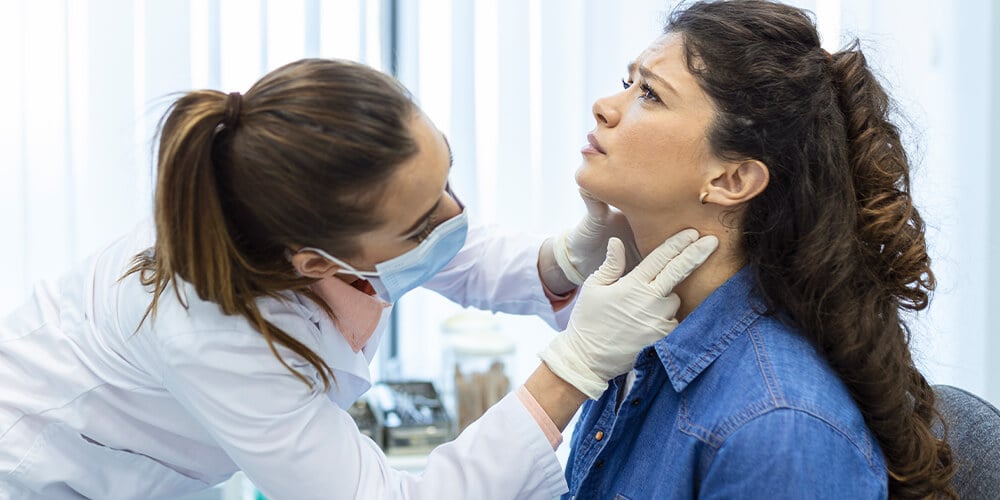Home » Thyroid Nodule Diagnosis and Treatment

The thyroid gland, a small butterfly-shaped organ located in the neck, plays a pivotal role in regulating metabolism and various bodily functions. However, when abnormal growths or lumps develop within the thyroid gland, they are referred to as thyroid nodules. While the majority of thyroid nodules are benign, a fraction may harbor malignancy, necessitating prompt diagnosis and appropriate treatment. This article delves into the intricate landscape of thyroid nodule diagnosis and treatment, shedding light on essential aspects to aid both healthcare professionals and patients.
Thyroid nodules are a common clinical entity, with prevalence increasing with age. These nodules can vary in size, ranging from millimeters to several centimeters in diameter. While the majority are non-cancerous, a comprehensive evaluation is imperative to rule out malignancy. Understanding the risk factors associated with thyroid nodules, such as iodine deficiency, radiation exposure, and familial predisposition, is crucial in their management.
Thyroid nodule diagnosis and treatment encompass a spectrum of pathologies, including benign adenomas, cysts, and malignant neoplasms such as papillary, follicular, and medullary carcinoma. Delineating between these entities is paramount for appropriate management decisions. Advanced imaging modalities, such as ultrasound, may aid in characterizing nodules based on their size, composition, and vascularity.
Thyroid nodule diagnosis and treatment typically begins with a comprehensive clinical evaluation, encompassing a thorough medical history and physical examination. Symptoms such as palpitations, dysphagia, or hoarseness may raise suspicion for underlying thyroid pathology. Furthermore, assessing risk factors, including family history and radiation exposure, guides subsequent diagnostic algorithms.
Imaging modalities play a pivotal role in characterizing thyroid nodule diagnosis and treatment guiding further management. High-resolution ultrasound serves as the cornerstone of initial evaluation, providing detailed information regarding nodule size, echogenicity, and presence of calcifications. Additionally, nuclear medicine scans, such as technetium-99m pertechnetate or iodine-123 scintigraphy, may aid in functional assessment, particularly in cases of hyperfunctioning nodules.
Fine-needle aspiration biopsy (FNAB) represents the gold standard for evaluating thyroid nodules, enabling cytological examination of cellular material obtained from the nodule. This minimally invasive procedure offers high diagnostic accuracy in distinguishing between benign and malignant nodules, thereby guiding further management strategies. Ancillary techniques, including molecular testing and gene expression profiling, may augment FNAB results in select cases, facilitating personalized treatment approaches.
In cases of benign thyroid nodule diagnosis and treatment with indolent features, a conservative approach of watchful waiting may be warranted. Regular surveillance with clinical examination and serial imaging allows for close monitoring of nodule progression and development of concerning features. However, vigilant observation remains paramount to promptly identify any signs of malignant transformation.
Thyroidectomy, the surgical removal of part or all of the thyroid gland, represents the definitive treatment for symptomatic or malignant thyroid nodules. Surgical intervention is guided by nodule size, location, and risk of malignancy. Advances in surgical techniques, such as minimally invasive approaches and intraoperative nerve monitoring, have enhanced surgical outcomes while minimizing morbidity.
Despite advancements in diagnostic modalities and treatment options, several challenges persist in the management of thyroid nodules. One such challenge is the risk of overdiagnosis and overtreatment, particularly in cases of indolent or asymptomatic nodules. Striking a balance between aggressive intervention and conservative management remains paramount, highlighting the importance of shared decision-making between healthcare providers and patients.
Furthermore, the interpretation of thyroid nodule diagnosis and treatment cytology can be inherently subjective, leading to variability in diagnostic accuracy among pathologists. Standardization of reporting systems, such as the Bethesda System for Reporting Thyroid Cytopathology, aims to mitigate this variability and enhance interobserver agreement. Continued efforts in quality assurance and proficiency testing are essential to ensure consistent and reliable cytological diagnoses.
Radioactive iodine therapy may be indicated in cases of hyperfunctioning thyroid nodule diagnosis and treatment or residual thyroid tissue following thyroidectomy. This targeted therapeutic approach relies on the uptake of radioactive iodine by thyroid tissue, resulting in selective ablation of nodular tissue while preserving surrounding structures. Close monitoring of thyroid function and potential side effects, including radiation-induced thyroiditis and sialadenitis, is essential following radioactive iodine therapy.
In recent years, several emerging trends have shaped the landscape of thyroid nodule diagnosis and treatment. The advent of molecular testing has revolutionized risk stratification and personalized management strategies. Molecular markers, such as BRAFV600E mutation and ThyroSeq panel, provide valuable prognostic information and aid in decision-making regarding the extent of surgical intervention.
Moreover, there is growing interest in the role of artificial intelligence (AI) and machine learning algorithms in thyroid nodule diagnosis and treatment evaluation. AI-based tools offer the potential to streamline image interpretation, improve diagnostic accuracy, and facilitate risk stratification based on radiographic features. Integration of AI technologies into clinical practice holds promise for enhancing efficiency and standardization in thyroid nodule management.
Amidst the complexities of thyroid nodule management, it is imperative to prioritize patient-centered care and education. Empowering patients with knowledge about their condition, treatment options, and potential outcomes fosters informed decision-making and active participation in their healthcare journey. Clear communication, empathy, and shared decision-making between healthcare providers and patients are cornerstones of patient-centered care.
Additionally, ongoing patient education initiatives aimed at promoting thyroid health awareness and early detection of nodular disease are essential. Public health campaigns emphasizing the importance of regular thyroid screenings, particularly in high-risk populations, can facilitate early diagnosis and intervention, ultimately improving patient outcomes.
In conclusion, the management of thyroid nodules is a dynamic and evolving field that requires a multifaceted approach encompassing clinical expertise, advanced diagnostics, and patient-centered care. By embracing emerging technologies, fostering interdisciplinary collaboration, and prioritizing patient education, healthcare providers can navigate the complexities of thyroid nodule diagnosis and treatment management with confidence and competence. Together, we can unravel the mysteries surrounding thyroid nodules and ensure the delivery of optimal care to patients worldwide.
Hello!